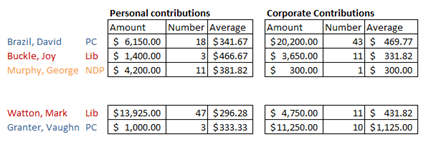Town and Toronto start with a “T”.
Some Townies can be like some Torontonians sometimes.
Yes, yes.
Settle down.
Hold it down with the other “t” words, like twit, twillick, and twaddle monger.
You are getting ahead of the story.
Townies, like Torontonians sometimes seems to think that all that matters in the world orbits the tight pucker of their collective arsehole.
The news media in this province are dominated by the townie-based daily crowd. Lots of things that happen beyond their usual watering holes in the downtown or their homes in the east end of Town can go sailing past them and hence their audience.
If you wanted an example of just how much gets missed, take this media commentary on a recent poll and what it supposedly means.
Like it or not, the bulk of the wealth in this province is in St. John's and that's where parties have the most luck raising cash. The Liberals had money problems long before they started musing about "diverting oil money" to rural areas (presumably at the expense of St. John's), and when Liberal candidate Danny Dumaresque slammed the idea of giving any extra cash to St. John's, the sound you heard (over the collective gasp of the endangered urban Liberals) was the thump of every chequebook in the capital city slamming shut.
A look at the most recent financial statements from the province’s electoral office shows pretty clearly what’s been going on in the province over the past while.
The picture isn’t pretty and it also is nothing like that paragraph would lead you to believe, either.
The provincial Conservatives rake in the lion’s share of the cash compared to all other parties, bar none. Government parties usually do in this province. People like to curry favour.
What’s noticeably different since 2003 compared to previous years is that the companies that give to the “in” party no longer give to the “out” parties.
There’s a reason for that and the reason is more likely related to the attitude the Tories have displayed to political pork and electoral districts than it is to the Liberals alienating the townie money pits.
No one should be surprised if donors quietly got the message that the powers that be would look unfavourably on donations to the other guys, in the same way voters have been told bluntly they needed to vote Blue if they wanted their grandchildren to know what pavement looks like for real instead of just in pictures.
Another noticeable characteristic of the Tory political cash is that it comes primarily from corporate sources, not individuals.
That’s been especially true for the people who have made quite a haul the past four years from the boom in provincial government capital works contracts over the past couple of years. The construction industry both in the province and on the mainland gave more than $230,000 to the provincial Conservatives in 2010.
The argument in that media commentary is that the Liberals haven’t been able to raise money because they have turned their back on townies.
Now if that were true, then we’d expect to see the New Democrats, who are pretty well all- townie-all-the-time, would have more luck with donations.
Guess again.
The Dippers get lots of small donations from individuals, most of whom live in and around Capital City.
But there isn’t really a lot of cash in their bank accounts.
What’s more, their biggest single donor is a Toronto-based union that for the past two years dropped 20 large on the NDP in this province. Before that it was a Washington DC union that ponied up 10K.
That’s because, as much as anything else, political cash is tied to at least three things.
First is incumbency. You have to be in power or likely to be in power to warrant attention from donors in these parts. That’s an old connection that the politicos themselves drew decades ago and the connection has persisted over time. There are companies all over the province, not just in Sin Jawns
Second is the political culture. Individuals don’t seem to give much to parties, relatively speaking, over time. 2010 is no exception. Take a look at the analysis by labradore and you can see the extent to which this is true.
And that’s likely because – third – the parties aren’t organized and interested in individuals. Old habits die very hard and parties like the Liberals and Tories that got used to corporate cash have just kept looking for corporate cash.
Besides, they, like the NDP, also aren’t built around individual members who actually run the party. It just wouldn’t occur to them to try and build the party on appealing to individuals to get out an participate. Even if it did occur to someone, they’d go at it half-heartedly if they went at it at all.
The fundraising problems the Liberals have come from some chronic problems over the last five or six years. The biggest one is basically a lack of focussed effort. That’s also what’s caused the lack of general preparedness and the problems in candidate recruiting as well.
On a local level, in some districts, they are doing quite well and likely will do quite well. Candidates have been raising money and they have volunteers and a momentum going. There might even be some surprises. That’s all taking place well outside of Sin Jawns, though, and as a result, the details won’t show up in daily media in the province.
Consider that to be the reverse of the NDP where their usual sort of campaign – not much cash or workers – comes across as amazingly gigantic in news reports because it is so close to reporters they can’t see the wider details.
And all that sort of skewed reporting and commentary is pretty much what happens when the frame of reference is the imaginary centre of a largely imaginary universe.
- srbp -
